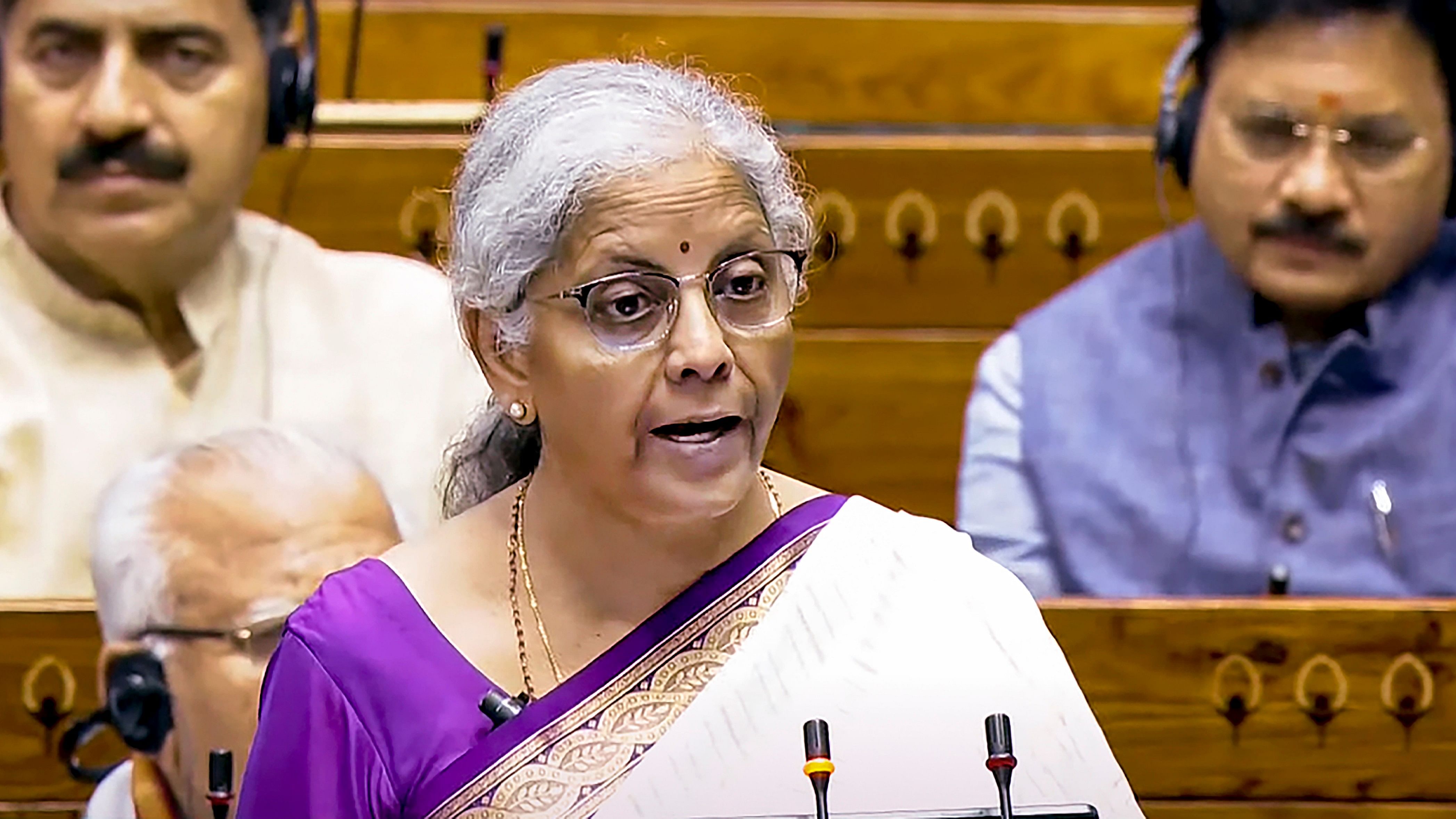
Union Finance Minister Nirmala Sitharaman presenting the Union Budget 2024 in the Parliament.
Credit: PTI Photo
‘To enhance domestic value addition in gold and precious metal jewellery, I propose reducing customs duties on gold and silver to 6 per cent from 10 per cent,’ Finance Minister Nirmala Sitharaman said in the Budget speech. A decision encompassing the reduction of customs duty on gold is influenced by various economic policies and objectives. While it boosts demand for gold, reduces smuggling, and supports the gold industry, a cut in customs duty can significantly and adversely impact a country’s trade balance, especially if the country is a net importer of gold like India.
According to the Jefferies report, 15.5 per cent of total Indian household assets as of March 2023 are in gold. Gold’s share is second only to real estate, which accounts for 50.7 per cent. Bank deposits (14 per cent), insurance funds (5.9 per cent), provident and pension funds (5.8 per cent), equities (4.7 per cent), and cash (3.4 per cent) make up the rest.
This Budget incentivises investment in the two major asset classes held by Indian households: gold and real estate. The finance minister has reduced the long-term capital gains (LTCG) tax rate on the sale of property from 20 per cent to 12.5 per cent. However, the indexation benefit has been removed from the calculation of LTCG on property sales. In the post-Budget press conference, the finance minister clarified that properties bought before April 1, 2001, will have to choose the purchase price higher of the following: (a) the actual property price; (b) the fair market value of the house as of April 1, 2001. This means that such old properties will enjoy indexation benefits until 2001. Niranjan Hiranandani, founder and managing director of Hiranandani Group, said these Budget provisions will draw investors back into real estate.
Stock markets reacted negatively to the Budget. As the finance minister dropped a tax bombshell, Sensex fell up to 1,278 points intra-day, only to recover partially on the Budget’s push for both growth and fiscal responsibility. “From the market perspective, the raising of the short-term capital gain (STCG) tax to 20 per cent and the LTCG to 12.5 per cent is a body blow. We need to brace ourselves for a negative reaction in the short term,” said Sanjay Sinha, founder of Citrus Advisors. Even though both the LTCG and STCG on equities have increased, Sensex recovered most of its losses as
the fiscal deficit target was pruned to 4.9 per cent and Capex allocations were in line with market expectations.
The Budget has done well to discourage the increasing speculative activity in the futures and options (F&O) segment by increasing the securities transaction tax (STT) on options to 0.1 per cent and 0.02 per cent on futures. But the increase in both the LTCG and STCG on equities may discourage more long-term savings from being channelled into the stock markets, particularly by millennials.
Personal income tax payers, particularly salaried employees, have high hopes for major relief in this budget. The Budget meets their hopes only to some extent. The finance minister announced a hike in the standard deduction to Rs 75,000 from Rs 50,000 and brought some changes to the tax slabs under the new tax regime, allowing salaried employees to save up to Rs 17,500 in income taxes. Considering the increased tax compliance and buoyancy in income tax collections, the finance minister could have been more generous in this regard. Also, reducing the tax slabs to either three or four slabs from the current six slabs would have brought a real feel-good factor for the taxpayers.
The minister has also announced three schemes under employment-linked incentives and said the government will allocate Rs 2 lakh crore for job creation over the next five years. Scheme A includes the direct benefit transfer of a one-month salary in three instalments up to Rs 15,000 to first-time employees registered with the Employees’ Provident Fund Organisation (EPFO). Scheme B revolves around job creation in the manufacturing sector. Scheme C envisages support for employers by way of reimbursement to employers of up to Rs 3,000 per month for two years towards their EPFO contribution for each additional employee. The real impact of these schemes on employment generation will depend on how they are actually implemented on the ground and whether these incentives are viewed as substantive by employers.
All in all, the Budget is a mixed bag and can’t be termed as path-breaking for the Modi 3.0 regime.
(The writer is a retired corporate professional)
Union Budget 2024 LIVE | Making a record for any Finance Minister, Nirmala Sitharaman presented her 7th consecutive Union Budget on July 23, 2024 under the Modi 3.0 government. This Budget brought tax relief for the middle class, while focusing on jobs through skilling, incentivising employers. Track the latest coverage, live news, in-depth opinions, and analysis only on Deccan Herald. Also follow us on WhatsApp, LinkedIn, X, Facebook, YouTube, and Instagram.